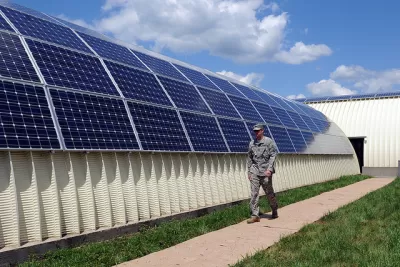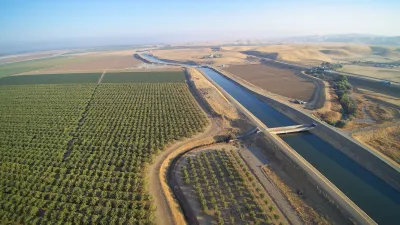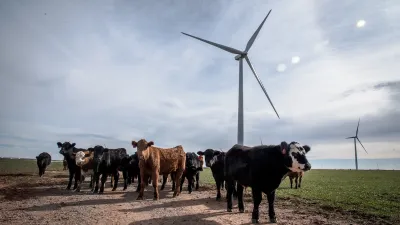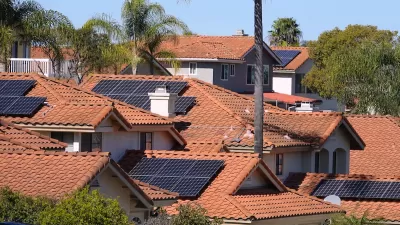A bill that would cut back on the feed-in tariffs paid by utilities to solar panel owners in Kentucky.

"Kentucky's urban-rural divide surfaced during a legislative committee's final discussion about a controversial solar energy bill Thursday before it was narrowly passed with three new members added to the panel," reports James Bruggers.
House Bill 227—backed by utilities and politicians that support the coal industry—would "slash credits that utilities must provide to future solar panel owners for any extra electricity they produce."
As referenced by Bruggers in the lede, the political debate over the bill in committee pitted representatives from rural areas against representatives from the state's two largest cities.
Rep. Brian Linder, R-Dry Ridge, said that "98 to 99 percent of letters" commenting on the bill came from Louisville and Lexington. "I'll be voting for my constituents," he said, adding that they don't want to "subsidize" people in the state's two largest cities.
The state's fledgling solar industry opposes the bill, saying it could double the time it takes for residents to cover the costs of their solar energy systems and costs "hundreds of jobs" at installation companies. Other opponents say larger utility companies could use the bill to take control of more of the solar market.
FULL STORY: Anti-solar bill moves in Kentucky House, despite resistance from Louisville and Lexington

Study: Maui’s Plan to Convert Vacation Rentals to Long-Term Housing Could Cause Nearly $1 Billion Economic Loss
The plan would reduce visitor accommodation by 25,% resulting in 1,900 jobs lost.

North Texas Transit Leaders Tout Benefits of TOD for Growing Region
At a summit focused on transit-oriented development, policymakers discussed how North Texas’ expanded light rail system can serve as a tool for economic growth.

Why Should We Subsidize Public Transportation?
Many public transit agencies face financial stress due to rising costs, declining fare revenue, and declining subsidies. Transit advocates must provide a strong business case for increasing public transit funding.

How Community Science Connects People, Parks, and Biodiversity
Community science engages people of all backgrounds in documenting local biodiversity, strengthening connections to nature, and contributing to global efforts like the City Nature Challenge to build a more inclusive and resilient future.

Alabama: Trump Terminates Settlements for Black Communities Harmed By Raw Sewage
Trump deemed the landmark civil rights agreement “illegal DEI and environmental justice policy.”

Dear Tesla Driver: “It’s not You, It’s Him.”
Amidst a booming bumper sticker industry, one writer offers solace to those asking, “Does this car make me look fascist?”
Urban Design for Planners 1: Software Tools
This six-course series explores essential urban design concepts using open source software and equips planners with the tools they need to participate fully in the urban design process.
Planning for Universal Design
Learn the tools for implementing Universal Design in planning regulations.
City of Santa Clarita
Ascent Environmental
Institute for Housing and Urban Development Studies (IHS)
City of Grandview
Harvard GSD Executive Education
Toledo-Lucas County Plan Commissions
Salt Lake City
NYU Wagner Graduate School of Public Service





























